#TwitterChat: Keeping communications relevant in a new normal forced by COVID-19
Transparent and concise communication is the need of the hour during the COVID-19 crisis times – be it for spreading awareness, in giving instructions, assuring people, and to avoid panic reactions. The alarming spread of fake news has made it all the more important for people to know what the true facts are.
Adgully has taken on the mantle of highlighting the ground realities of the market amidst the global Coronavirus pandemic through its #TwitterChat initiative. The topics touched upon so far include – Responsible Communication During Covid-19 and Managing Creativity While Working from Home.
Adgully’s #TwitterChat endeavour has received great traction amongst the industry, witnessing a 115 per cent surge in engagement ever since the industry started working from home. Both industry leaders as well as Twitteratis from India and globally have been joining in the discussions.
Adgully’s #TwitterChat has become an industry platform known to propagate facts and the right communication, as well as providing a digital forum where the industry can highlight relevant issues and find solutions. This initiative has been hugely applauded by the industry.
Continuing these efforts, Adgully organised a #TwitterChat on ‘Power of PR During Crisis’, where the leading communications experts discussed the role of Public Relations especially in an unprecedented global crisis such as COVID-19. The TwitterChat took place on Friday, April 3, 2020.
Joining in the conversation were:
Aman Dhall, Head of Corporate Communications, Policy Bazaar (Moderator)
Valerie Pinto, CEO, Weber Shandwick
Kiran Ray Chaudhary, Co-founder and Joint MD , 80db communications
Arwa Husain, Director, Adfactors PR
Madhavi Jha, Chief Communications Officer, Cairn Oil and Gas
Sujit Patil, Vice President and Head, Corporate Brand Communications, Godrej Industries Limited
Commencing the discussion, Aman Dhall asked the panellists, “Is the current scenario a crisis situation for your brand? If yes, how are you managing internal and external communications right now?”
Arwa Husain began the round of answers by saying, “The communication line should be kept open with all stakeholders 24X7.” She further added, “Good public relations will be driven by good behaviour and not communications alone. We will see a new business risk paradigm in the coming weeks. The field of communication, post-Covid will be vastly different from the pre-Covid one we know and are comfortable with.”
Talking about oil & gas industry, Madhavi Jha said, “It is a business challenge and a brand challenge for the oil & gas exploration and production sector. Not only do we have to keep production going as normal, we must do it at an entirely abnormal time.” She informed that currently there are 1,800 people from Cairn Oil and Gas working onsite, who have been working all the shifts as a new crew has not been able to relive them due to travel restrictions. “We are calling them our own frontline heroes,” she added.
When asked, “How are you assessing the impact of your company's internal and external communications efforts during the current crisis? What's the metric?” Jha replied, “Producing with a seventh of the workforce on the rigs, with anxious subcontractors and suppliers, and Covid-19 measures, distancing, disinfection, screenings – this means having to motivate the frontline crews every day.” Dhall also asked about proactive communication and morale of the crew, to which Jha responded by saying, “The communication has to be personal, every day, and in every way. We're using Zoom meetings for a virtual coffee with CXOs. Weekly updates on ground covered and battles won from the CEO. And social media features on site and people's achievements.”
Meanwhile, Kiran Ray Chaudhary remarked, “The only way to manage this existential/ humanitarian crisis is through transparent, empathetic and honest communication.”
Sujit Patil added here, “It is important for brands to be purpose-driven, but it is equally important for brands to stay clear of opportunism.” Dhall further asked Patil about how Godrej is ensuring purpose driven communication, to which Patil replied, “By showcasing the good that we and people are doing in an authentic manner and living up to the larger national calling.”
“From a business continuity standpoint, we have a new normal that we have to deal with. Both at the client side as well as the agency side. Over communication, constant engagement and innovative thinking to recraft the narrative will help tide us over,” felt Valerie Pinto.
In these times, PR has a strong role to play when it comes to communication in the midst of crisis. Dhall’s next question to the panellists was, “What are the 3 key principles in your crisis communication strategy?”
“Listen more, Be Authentic, Be Data-Driven in your decisions,” was Patil’s answer, as he suggested, “Set a protocol in place, Communicate POEM–Purpose before Opportunity, Empathy before Money!”
Husain listed them down as, “1) Heightened sensitivity and empathy; 2) Be Agile - respond to the dynamic landscape and changing scenario; and 3) Communicate at all times.” Citing Adfactors PR’s example, she mentioned, “We have been able to stay connected with clients, throughout the day. In fact, we are doing BAU++. In the last 10 days, we have successfully held two virtual PCs consisting of 70 to 80 journalists. All our 800 employees are in WFH mode to ensure smooth business continuity. We have been able to successfully put all systems and processes in place, way before the lockdown was announced.”
Pinto added here, “Be transparent and genuine by calling it as it is. Your employees will value you for your honesty at this point. How you live the values of your organisation in this time of crisis will go a long way in defining your reputation.” Dhall further asked her, “How do you think the PR industry can come together and address some issues. Can PR associations play some role?”
Pinto responded by saying, “As an industry, we stand together on how we arrive at solutions for our people and our business in these critical times. It is our responsibility to carry small and large business along and keep talent as top priority.”
Continuing the conversation, Dhall shifted the focus to the consumer and asked the panellists, “What are the expectations of your consumer in the current crisis? How are you engaging with them?”
Patil remarked, “Campaigns must be symbiotic and not parasitic. If it is not connected to a purpose that resonates with your organisation value, people will call it out.” He further added, “Share regular updates on product availability, service channels, quality maintenance. Avoid price hikes.” Dhall then enquired about the possibility of the PR and Corp Communications industry starting a campaign on the larger issues in the current scenario. To which Patil replied, “Of course! Need is to build the country and city branding post the pandemic! Only this fraternity can bring back the good perception!” Dhall also asked Patil to cite Godrej’s data driven decisions, to which he pointed out, “Constantly monitoring the ORM system, listening across platforms, Understanding the trends and not being emotional but objective about any adverse narratives.”
Chaudhary added here, “This is a crisis like no other and does not really have a readymade blueprint! Sure, some tenets of crisis communications apply. This is not really a reputation crisis for brands (unless it becomes one for them), but is existential in nature.”
Husain noted, “Clients are interested in us going beyond the defined scope of work. They want us to tell them reputation risks ahead of time, to be creative and provide solutions and lastly, be honest without any sugar coating.”
Dhall then enquired about scenarios where the PR has overridden the brand and communication guidelines.
Patil pointed out, “During such times, when vulnerability to be viewed as opportunistic is high, even if the intent is right, ideally, stick to the guidelines. All guidelines must be regularly monitored, tested and amended to suit the changing scenarios.”
According to Husain, “In these uncertain times you need to be innovative. If this means that you are stepping out of your periphery and communication guidelines, then so be it. You should be guided by your ethical and moral responsibilities. The biggest mistake is being indecisive. There can be no greater sin than inaction in a crisis. It is important to act quick and not deliberate on decisions by weighing all the possibilities and scenarios.” Citing an example, she said, “We have seen several brands come up with interesting social distancing messages. A consumer brand logo was not appreciated, but what I liked was that they showed sensitivity by withdrawing and even apologising.”
On the other hand, Jha felt that one cannot override the fundamental thumb rules of accuracy, relevance, timeliness. “Albeit, timeliness and speed become more critical,” she added.
Dhall then wanted to know, “Who is more important for you right now from a communications perspective in order of priority -- consumer, employee or government authorities?”
Husain replied, “For our clients: These are anxious times, hence it is important that we stand by them throughout and manoeuvre the ship through this crisis. We are the ship in the storm, our teams are like the sailors, our clients are like the passengers and the government is the beacon of light guiding the ship. Each one is equally important in his/her own aspect.” She also added, “For our sailors: Yes, we are not used to WFH, hence it is important to stay connected. Especially those who are alone and away from their families. In fact, we have downtime like dumb charade to keep the morale high.”
For Patil, “All stakeholders are important and must be engaged. Reputation is not built by only a particular stakeholder. Communication has to be consistent and segment wise.”
In the concluding part of the discussions, Dhall asked the panellists their one-line mantra to manage a crisis. This is what they said:
Sujit Patil: “Preparation for #CrisisCommunications should not be an afterthought. Prepare through the year to ring-fence your brand from plausible crises. Don’t be zealous to classify every incident as a crisis. Be data-driven in your decision.”
Arwa Husain: “Display AQ (Adaptability Quotient). An organisation must display strong and effective leadership. Empathy, compassion & generosity should be guiding factors. Stand tall in this hour of crisis. This, too, shall pass.”
Madhavi Jha: “Communicators must be thoughtful, sensitive to time, effort, purpose of everyone doing their jobs. It must serve business and people goals, and not get in the way. Step up and remind business and people of the purpose, principles and values the company must stand for at all times.”
What Twitteratis had to say
However, the conversation didn’t end there. Apart from our esteemed panel, we also had responses of other global industry experts and Twitteratis. They not only added to the conversation by giving their opinion, but also raised various questions about the current scenario. Here’s how the conversation was driven from their end:
It's a global crisis and crisis for all corporates and brands. As in all crises, focus must be on helping those most directly impacted, not on your brand or reputation. The companies that will emerge with the strongest reputations will be those that put people first. #TwitterChat
engagement for sure. Over communication might kill the productivity
— Rishab Dutt Sharma (@mountainman_30) April 3, 2020
The challenge this time is being on feet 24 x 7 but in lockdown. #PR
Three Cs - Clarity, Consistency, Candidness - be clear, be consistent, be transparent, be honest. #TwitterChat
— Stuart Bruce PR Futurist 🦄 (@stuartbruce) April 3, 2020
I have an even bigger question which is very challenging. There is a surge in working hours and the pressure is almost doubled to deliver under stress. Are we all taking care of the post Covid19 scenario when employees get back to normal way of working?
— rneelmani (@rneelmani) April 3, 2020
We at @PRCAIndia have also started a #SupportEachOther initiative and getting experts to guide, counsel and sometimes just to listen. #Mentalhealth is a big challenge for most during these times.
— PRCAI (@PRCAIndia) April 3, 2020
This TwitterChat on ‘Power of PR During Crisis’ was a big success and it raised various questions and their solutions in the current scenario. As mentioned, Adgully #TwtterChat has become a platform for industry discussions. Here’s how this TwitterChat was appreciated:
Thanks @adgully and all for this great session. At these times of #lockdown the insights from you all is really helpful. Learning and Sharing #SupportEachOther #StayHomeStaySafe
— Anup Sharma B'Harry (@TweetsAnup) April 3, 2020
Great conversation happening right now - The Power of PR during Crisis#PR #TwitterChat https://t.co/twF8qYUqzX
— SCoRe (@SCoReInd) April 3, 2020
Fantastic and insightful session.
— Supreeth Sudhakaran (@supreeth_s) April 3, 2020
Thanks @amandhall25 @adgully @SujitPatil@madhavixjha @maskachaska @Kiran_Ray_C @adgully @PRCAIndia for a wonderful session#TwitterChat #COVID19 #PublicRelations #CrisisCommunications
— arwa husain (@arwa_husain) April 3, 2020
Great discussion and well moderated by @amandhall25. Was great to get some key insights that can help to give some direction amid the ongoing crisis!
— Neha Dewan (@neha_d24) April 3, 2020
Also Read:
#TwitterChat: Join India's top creative minds to crack the WFH formula today
TwitterChat: Being responsible in times of Covid-19, ad honchos show the way



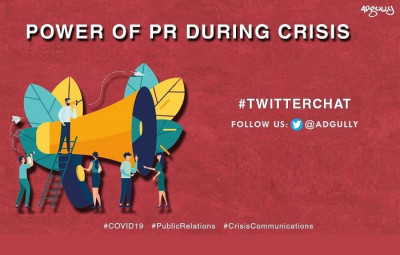
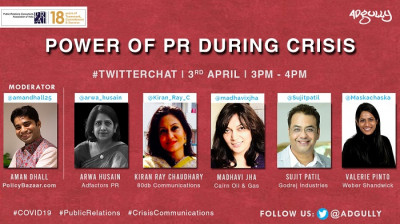

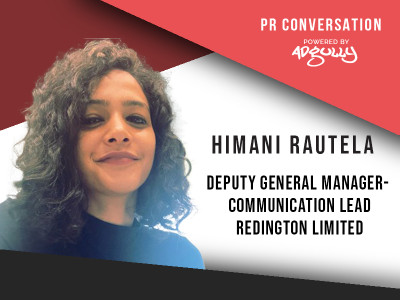

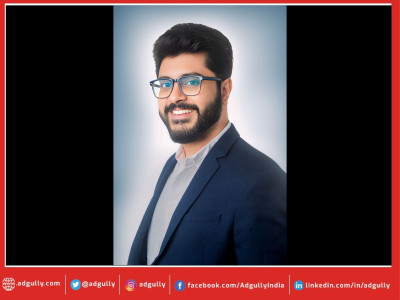


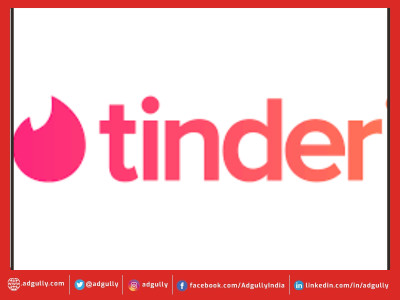



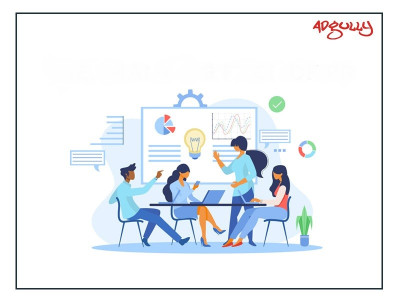



Share
Facebook
YouTube
Tweet
Twitter
LinkedIn